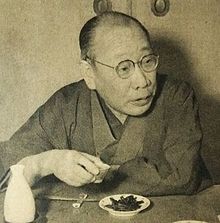Kubota Mantaro
Kubota Mantarō ( Japanese 久保 田 万 太郎 ; born November 11, 1889 in Tokyo Prefecture ; † May 6, 1963 ) was a Japanese writer.
Life
Kubota already wrote haiku as a student and published the short story Asagao and the play Yūgi in Mita Bungaku ( 三 田 文学 ), the university's literary magazine , while he was a student at Keiō University. Several novels appeared as a result. From 1919 to 1926 Kubota taught literature at Keiō University.
In addition, he worked as a dramaturge at the Shinpa Theater, for which he dramatized several novels by Izumi Kyōka . Together with Kume Masao , he became an employee of the Central Broadcasting Corporation Tokyo (today: NHK ) in 1926 , whose department for theater and music he headed until 1938. In 1932 he founded the Tsukijiza theater group ( 築 地 座 ) with Tomoda Kyōsuke and Tamura Akiko .
After Tomoda fell in China in 1937, Kubota founded the theater group Bungakuza ( 文学 座 ) with Kishida Kunio and Shishi Bunroku , which is still one of the leading Shingeki theater groups in Japan. As a haiku poet, Kubota was a student of Okamoto Shōhin and Matsune Tōyōjō . He himself published several haiku collections and was editor of the haiku magazine Shuntō ( 春 燈 ).
In 1957 Kubota was awarded the Order of Culture.
Works
- Asagao ( 朝 顔 ), short story
- Yūgi ( 遊戯 ), acting
- Uragare ( 末 枯 ), Roman
- Shundei ( 春泥 ), novel
- Shiseijin ( 市井 人 ), novel
- Kuregata ( 暮 れ が た ), play, 1911
- Amazora ( 雨 空 ), play, 1920
- Kokorogokoro ( 心 ご こ ろ ), play, 1922
- Fukō ( 不幸 ), play, 1924
- Mijikayo ( 短 夜 ), play, 1925
- Ōdera Gakkō ( 大寺 学校 ), play, 1928
- Kadode , play, 1931
- Tsuribori nite ( 釣 堀 に て ), play, 1935
- Akikusa-banashi , play, 1946
- Michishiba ( 道 芝 ), haikus
- Momochidori ( も も ち ど り ), haikus
- Ryūgūshō ( 流寓 抄 ), haikus
literature
- S. Noma (Ed.): Kubota Mantarō . In: Japan. An Illustrated Encyclopedia. Kodansha, 1993, ISBN 4-06-205938-X , p. 837.
- Gabrielle H. Cody, Evert Sprinchorn: The Columbia Encyclopedia of Modern Drama , Volume 1, Columbia University Press, 2007, ISBN 978-0-231-14422-3 , pp. 784-85.
Web links
| personal data | |
|---|---|
| SURNAME | Kubota, Mantaro |
| ALTERNATIVE NAMES | 久保 田 万 太郎 (Japanese) |
| BRIEF DESCRIPTION | Japanese writer |
| DATE OF BIRTH | November 11, 1889 |
| PLACE OF BIRTH | Tokyo prefecture |
| DATE OF DEATH | May 6, 1963 |
